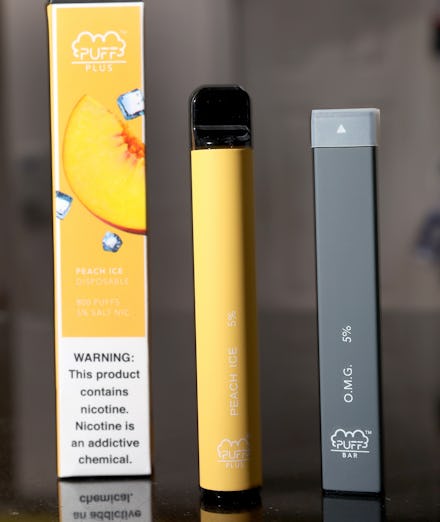When fruit-flavored vapes were banned, Puff Bar found a way in: synthetic nicotine
Congress is now trying to close this loophole.

By now, most of us are aware that vaping can be terrible for your body. You may also know that in recent years, the F.D.A. has cracked down on vapes by banning fruit flavors — which are primarily marketed to teens — and forcing manufacturers to request approval in order to stay on the market. That has resulted in many vapes being removed from store shelves, but some sneaky companies dodged the ban by using fake nicotine made in labs instead of tobacco-derived nicotine. Now Congress is trying to close the loophole that allowed some fruity vapes to stay on the market.
While the F.D.A. has the authority to decide whether or not products that contain nicotine that comes from tobacco are sold, it does not have the same authority over synthetic nicotine products. Sneaky sneaky. So, one of the most popular vape brands amongst teens, Puff Bar, switched to synthetic nicotine last year so it could continue to be sold in all the fruity flavors that consumers adore such as mojito and pink lemonade.
And in this switching of substances within the actual e-cigarette lies the loophole that allows them to stay on shelves. Only fruity vapes that contain tobacco-based nicotine are controlled by the F.D.A. — Puff Bar and its competitors aren’t. Congress is moving to close the giant loophole by giving the F.D.A. the authority to regulate synthetic nicotine, too. This legislation is part of a larger spending bill proposed on Tuesday that is expected to pass in the next few days.
Lawmakers and public health advocates alike are vocal in their support of the legislation. “This provision will help ensure that decades of progress to address youth tobacco usage will not be undermined by bad actors attempting to evade FDA regulation and hook a new generation of young people into a lifetime of nicotine addiction,” House Energy and Commerce Committee Chairman Frank Pallone Jr. (D-N.J.), said in a statement. Bad actors indeed.
Synthetic nicotine is too new for a substantial body of clinical research to prove its potential danger, but recent studies suggest that it is more quickly absorbed by the body than natural nicotine and could be potentially more addictive as a result. Synthetic nicotine advocates, however, are trying to prevent bans. According to them, synthetic nicotine is a great harm reduction tool for people who want to quit smoking. Some scientists, however, think that the harm reduction argument for synthetic nicotine is entirely too flimsy and that it might even be being pushed by vape companies on the low.
Puff Bar has, in particular, been successful in evading regulation multiple times. When the F.D.A. temporarily barred fruit-flavored e-cigarettes with disposable cartridges from the market in 2020, Puff Bar was able to stay on shelves because their cartridges are disposable, according to the Washington Post. The F.D.A. ordered Puff Bar off the market, but the vapes returned to shelves last year with their new synthetic nicotine blend.
All these successful evasions have prompted some to dub the synthetic nicotine loophole, “The Puff Bar Loophole.” Whatever you call this devious corporate behavior, I hope the F.D.A. is able to rein it in. Vapes are too dangerous to ignore and corporate players shouldn’t get a pass on products that harm children. “There has never been a more blatant attempt to circumvent regulation,” Matthew L. Myers, president of the Campaign for Tobacco-Free Kids, told the Washington Post.